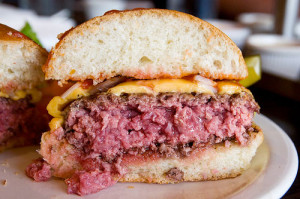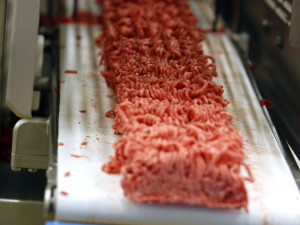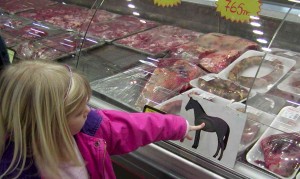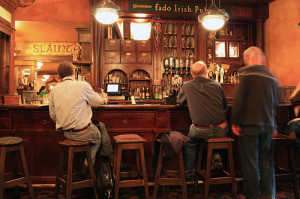Consumers and caterers should thoroughly cook minced beef and beef burgers before eating because they may contain harmful bacteria. A recently published Food Safety Authority of Ireland (FSAI) survey reports that Verotoxigenic E. coli (VTEC) and Salmonella were found in  samples of raw minced beef and beef burgers collected from retail shops and catering establishments in Ireland.
samples of raw minced beef and beef burgers collected from retail shops and catering establishments in Ireland.
This survey, detected:
1. VTEC in 2.5% (10/402) of samples tested using a non-serogroup specific PCR test for VTEC
2. E. coli O157 in 0.2% (2/983) samples tested specifically for E. coli O157, and
3. Salmonella Dublin in 0.1% (1/983) of the samples tested for Salmonella.
Although all the beef tested in this survey was intended to be cooked before eating, the presence of these pathogens could potentially cause human illness, either through undercooking or cross-contamination.
Cattle carry harmful bacteria in their gastrointestinal tract. These bacteria are also shed in faeces and can be present on the animal hide. Although strict hygiene procedures are used during slaughter, the animal’s carcase can – and does – become contaminated with these bacteria. When the carcase is then divided into the various cuts of meat, the contamination is transferred to the outside surfaces of those cuts of meat.
Cook thoroughly
 When meat is minced, bacteria that are on the surface of the meat become mixed throughout the mince, and this is why minced meat and beef burgers should be cooked thoroughly, but steaks or whole joints of beef may be eaten rare. Cooking minced beef and beef burgers to a core temperature of 75°C or equivalent (e.g. 70°C for two minutes) is recommended.
When meat is minced, bacteria that are on the surface of the meat become mixed throughout the mince, and this is why minced meat and beef burgers should be cooked thoroughly, but steaks or whole joints of beef may be eaten rare. Cooking minced beef and beef burgers to a core temperature of 75°C or equivalent (e.g. 70°C for two minutes) is recommended.
This FSAI survey found that minced beef and beef burgers were stored at temperatures greater than 5C in some retail or catering establishments. This included three samples in which VTEC were detected. While temperature abuse does not cause minced beef or beef burgers to become contaminated with pathogens, it does increase the risk to health as it may allow the number of pathogens present to increase. In catering and retail establishments, and in the home, raw meat should be stored at a temperature of 5oC or less in order to prevent or slow down the growth of any pathogens that may be present.
Testing for VTEC
The E. coli O157 test is the most common test used by laboratories to test food for VTEC. But the O157 test will not pick up any other VTEC that may be present in the food. When some of the samples taken for  the FSAI’s survey were tested using a broad ranging VTEC test, seven VTEC serogroups were picked up which would have been missed if only the E. coli O157 test had been used. These VTEC serogroups were: O6, O8, O130, O145, O149, O166 and an isolate which was O-unidentifiable.
the FSAI’s survey were tested using a broad ranging VTEC test, seven VTEC serogroups were picked up which would have been missed if only the E. coli O157 test had been used. These VTEC serogroups were: O6, O8, O130, O145, O149, O166 and an isolate which was O-unidentifiable.
If food business operators or official agencies consider it appropriate to test raw minced beef or beef burgers for VTEC, they should consider testing for a range of serogroups, in particular those most frequently linked to human illness. According to the European Food Safety Authority, these serogroups are: O157; O26, O103, O91, O145 and O111. The International Organisation for Standardisation (ISO) published a standard method for the detection of five of these serogroups in 2012.
The full survey report is available on the FSAI website at: http://bit.ly/109tYOj
The Prevention of Verotocytotoxigenic Escherichia coli (VTEC) Infection: a Shared Responsibility: http://bit.ly/17StdRf
Multistate Outbreak of Salmonella Typhimurium Infections Linked to Ground Beef: http://1.usa.gov/11eP3tf
Monitoring of Verotoxigenic Escherichia coli (VTEC) and identification of human pathogenic VTEC types: http://bit.ly/1252YUk
 The European Commission said it would publish all results from member states before the end of July.
The European Commission said it would publish all results from member states before the end of July.










.jpeg) the monthly inspection results as "extremely disappointing".
the monthly inspection results as "extremely disappointing". stolen.
stolen.